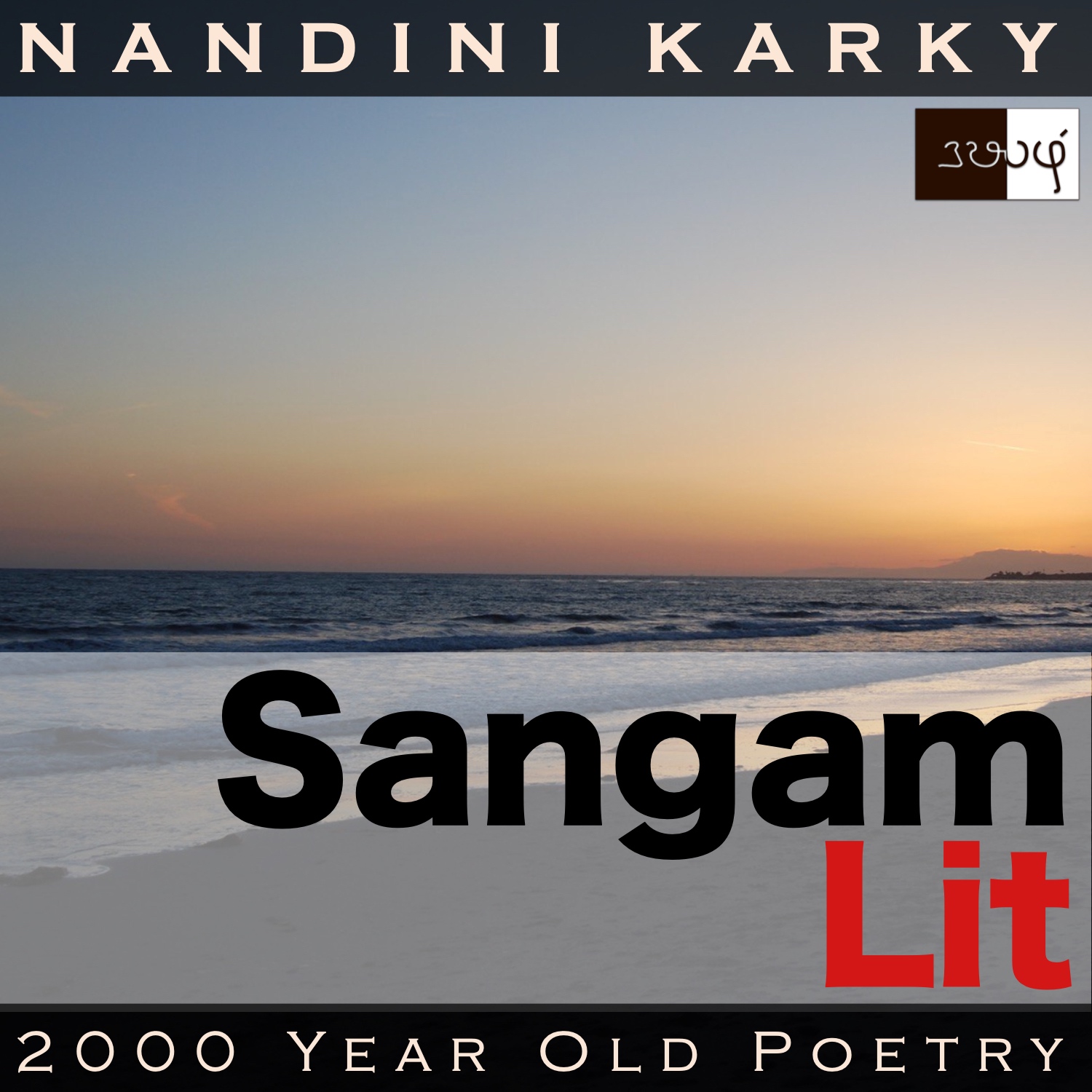Podcast: Play in new window | Download
Subscribe: Apple Podcasts | Spotify | Amazon Music | Android | iHeartRadio | TuneIn | RSS | More

In this episode, we savour the sights of an ancient evening and sympathise with a person’s pain, as portrayed in Sangam Literary work, Natrinai 117, written by Kundriyanaar. The verse is set in the ‘Neythal’ landscape or the ‘coastal regions’ and speaks in the voice of the lady to her confidante, expressing the inconsolable pain in her heart, at being separated from her man.
பெருங் கடல் முழங்க, கானல் மலர,
இருங் கழி ஓதம் இல் இறந்து மலிர,
வள் இதழ் நெய்தல் கூம்ப, புள் உடன்
கமழ் பூம் பொதும்பர்க் கட்சி சேர,
செல் சுடர் மழுங்கச் சிவந்து வாங்கு மண்டிலம்
கல் சேர்பு நண்ணிப் படர் அடைபு நடுங்க,
புலம்பொடு வந்த புன்கண் மாலை
அன்னர் உன்னார் கழியின், பல் நாள்
வாழலென்-வாழி, தோழி!-என்கண்
பிணி பிறிதாகக் கூறுவர்;
பழி பிறிதாகல் பண்புமார் அன்றே.
The moment you step into the poem, you are ushered away to an ancient shore, with the words ‘பெருங் கடல் முழங்க’ meaning ‘the vast seas roar’. Learnt a new word for ‘flood’ in ‘ஓதம்’. ‘நெய்தல் கூம்ப’ brings before your eyes, a ‘Neythal’ flower closing its buds. It’s here I want to take a moment to admire how there is a specific word ‘கூம்ப’, for a flower closing its petals in Tamil, whereas when I search for an antonym for the word ‘blossom’, all I find are bleak words like ‘wilt’ and ‘decay’. Perhaps, it’s the lands where these two languages have bloomed that make it so. One, a tropical land where the closing of a bud is an everyday thing and another, in the temperate regions, where, as the seasons change, ‘blossoming’ is replaced only by ‘wilting’. Returning from this rumination, we see this word ‘கட்சி’ which is used to mean a ‘political party’ in contemporary times, to mean ‘a nest’ here. I’m reminded of the phrase ‘birds of feather flock together’ perhaps to build a nest of a party! A few poems ago, we encountered ‘செல் வளி’ meaning ‘leaving wind’ and here we meet ‘செல் சுடர்’ meaning ‘leaving sun’. Rhythmic phrases like ‘புன்கண் மாலை’ meaning ‘painful evening’ and ‘என்கண் பிணி’ meaning ‘my affliction’ hint at the spreading agony. Let’s listen closely to perceive more.
The man and woman have been in a love relationship for a while and the man leaves to gather wealth for their wedding. The time he promised to return passes by and this fills the lady with a deep anguish. The confidante tries to console her but the lady refuses her consolation and says, “The great seas roar; The shore flowers; Passing our homes, the backwaters rise and flood; ‘Neythal’ flowers with luxuriant petals close their buds; Birds, with their mates, retire to their nests in the fragrant groves; The leaving sun fades, lighting up the sky red; Then, it reaches the mountains in the west and makes me shiver. This painful evening fills me with loneliness. Long may you live, O friend! People are attributing other reasons for my affliction. Letting blame be placed on the wrong thing is not righteous on my part. If our lord stays away without understanding my pain, I shan’t live long!” With these words, the lady shares the deep pain in her heart, caused by her lonely situation.
Refusing to be satisfied with the mere dipping of the feet in these ocean waves, let’s take a swim in the sea. The lady brings before our eyes, the scenes of the evening like an expert cinematographer. First, the roaring waves, then the shores bloom and what do they bloom with? The waters of the sea! The high tide rushes in to fill the backwaters and those waves rise up and pass the lady’s home. The lady seems to reveal her address as ‘101, Bay of Bengal’! The people then seemed to have lived one with nature, right next to the sea. If the tides rose, they let it be. The lady says the waters touched their houses and crossed beyond. When we cannot even imaging living in a space where the house gets flooded every day, does that worry the lady? No! She seems to be concerned with something else. She watches the waterlilies close their buds, signalling the dark is on its way, and the birds are returning to their nests with their mates. She looks behind and sees the sun setting into the western mountain ranges, painting the sky red, in parting. She mentions that this act by the sun makes her shiver. Why? Not because of the cold night! A lady who minds not a sea invading her home will not be shaken by the setting sun. The shivering seems to emanate from within!
The lady elaborates saying it’s because of her man, who stays away, without considering how the evening fills her with pain. Seeing the changes in her, her kith and kin are probing reasons why and misplacing it as the wrath of god. Her righteous mind refuses to allow this and is troubling her no end. So, she declares to her confidante that she shall not live long, if this were to go on. It’s fascinating to see the amount of importance accorded to the pain of separation. Separation, taken for granted, in our day-to-day life, is seen as something fatal here. Perhaps, since we are so separated from nature around us, we cannot fully understand the pain of separation this lady feels. The one good thing we can appreciate is that she has a friend, to express her deepest pain and dejected thoughts and that’s all it takes, to save a soul, be it then or now!




Isn’t Neythal a flower which blossoms at night?
The scientific name of Neythal flower is Nymphaea nouchali, and it is a day-blooming flower.
Please refer to this link – https://pza.sanbi.org/nymphaea-nouchali-var-caerulea which mentions “The flowers open in early to mid-morning and close completely in late afternoon and stay closed all night.”